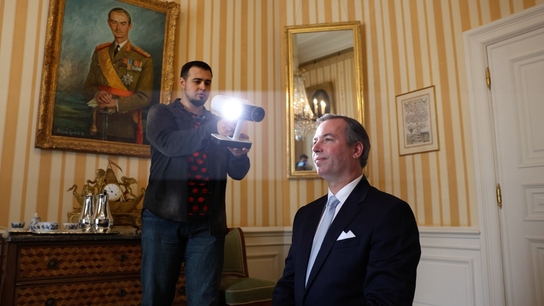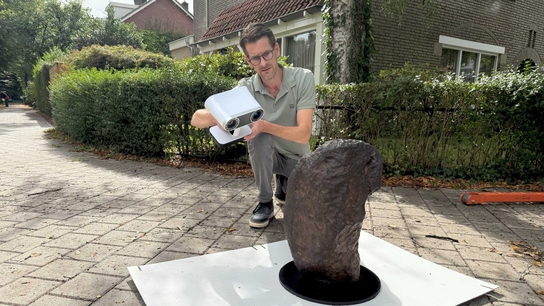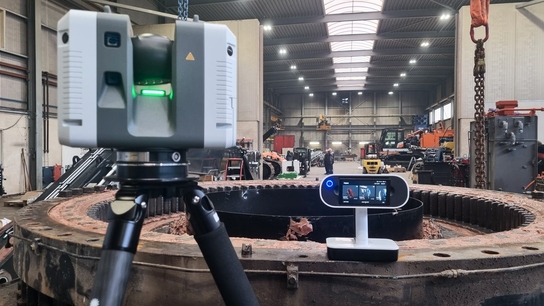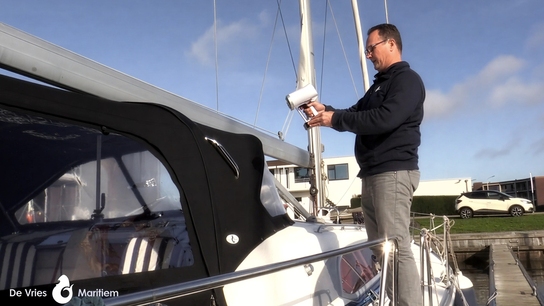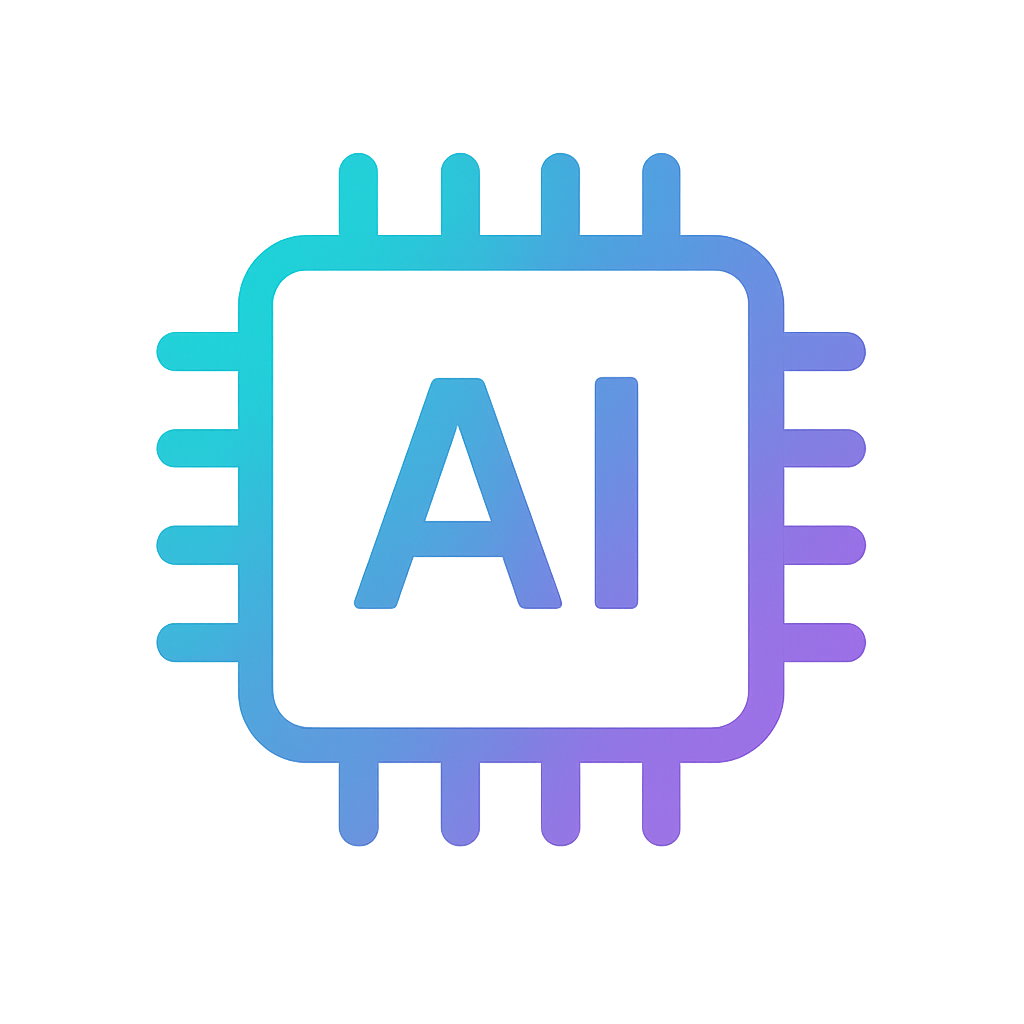Creating custom 3D-printed children’s helmets at Cerebra with Artec Eva
Summary: A UK charity focused on helping children with brain-related neurological conditions needed to create custom riding helmets using 3D scanning and printing.
The goal: To use a handheld 3D scanner to scan a child's head in less than one minute, then to take the precise 3D model from this and create a custom riding helmet via 3D printing and materials such as polystyrene, kevlar, fiberglass, etc.
Tools used: Artec Eva

Imogen can't run and play with the other children, but she can ride a horse. Born 11 weeks early with spastic diplegia, a form of cerebral palsy, much of her time is spent in a wheelchair or sitting down. Riding horses has been a great joy to Imogen, yet because she was also born with hydrocephaly, an excessive swelling of the brain, her head is wider than normal, which means she could never find a riding helmet that fitted correctly.
Every helmet she wore was either too big and would drop down over her eyes during riding, or was too small and uncomfortable. Her mother had to wedge a piece of material in under a larger helmet to keep it from moving around, but after a short while Imogen would have an ever-increasing headache.
Despite being unable to find a comfortable riding helmet, Imogen's love and dedication for the sport grew into her taking part and starting to excel in dressage riding, which made it all the more important for her to find a correct fitting helmet. Horse riding is a risky activity, with the emergency room admission rate for injured riders being up to 400% higher than those of motorcycle riding, football, and skiing.
Frustrated with a lack of options, Imogen's mother, Catherine, turned to Cerebra. A charity known throughout the UK for creating custom products for children with additional needs. Located within the University of Wales Trinity Saint David, Cerebra Innovation Centre (CIC) is a 100% donation-funded organization that develops highly functional, innovative, and fun products that not only put children back in the game of life, but are also so attractive that quite often other children who see them on the playground or at school begin asking their parents if they can have the same.
The design engineers at Cerebra Innovation Centre have already made several custom helmets for children with hydrocephaly. Dr. Ross Head explained how it all began. “The very first process was using the Artec Eva scanner, once I saw what it could do, my mind began percolating with ideas on how we could make use of it in our work, and that’s when it hit me! The idea of using it to make bespoke helmets.”
He went on, “The final design/production process clicked into place when I thought up the synergy of scanning, 3D printing the moulds, fibreglassing the shell and CNC machining the polystyrene liner.”
Ross Head was first introduced to the Artec Eva by Ian Walsh, director of ATiC (Assistive Technologies Innovation Centre) and their team of innovators. Prior to this, ATiC consulted with the 3D scanning specialists at Artec’s Gold-Certified Reseller Central Scanning, and it was during a presentation of Artec’s scanners when ATiC understood that Eva would be an invaluable addition to their tool chest.
ATiC is an integrated research center, putting user-centered design thinking and strategic innovation tools into practice with a strong emphasis on collaboration within Health and Wellbeing.
ATiC utilizes a range of reality capture technologies such as 3D scanning, biomechanics and eye tracking. Along with a range of advanced prototyping facilities, such as state-of-the-art 3D printers. ATiC also supports and helps many other charities and organizations by innovating new products, services, and systems across the health and wellbeing sectors.
The ATiC team has so far collaborated with Ross at Cerebra, providing 3D scanning using Artec Eva, innovating the development of Imogen’s helmet. This collaboration will hopefully be the first of many, as both ATiC and Cerebra aim to develop and innovate the design and manufacture process even further.

Imogen and Artec Eva during scanning
The Artec Eva is a lightweight 3D scanner that uses 100% safe structured white light and scans quickly, requiring children to hold still for less than one minute. The 3D scan appears in real time on the screen in Artec Studio, the scanner’s software. Scans are then processed and exported off to CAD software prior to 3D printing. Once in CAD software, an offset of the child’s head is created, which allows the exact dimensions for creating a precise 3D model that will in turn be made into a perfectly fitting helmet.

Imogen and Artec Eva during scanning
"Imogen was curious about the Eva as it was scanning her face and head, and because it’s entirely safe, it wasn’t a problem when she peeked a few times during the scanning. And she found it no struggle to hold still during the scan, which was over before she knew it," said Ross Head.

Real time Artec Eva scan of Imogen in Artec Studio software
After scanning and exporting to CAD, a two-part model is created. Ross then explained the physical process of the helmet’s creation. “The inner polystyrene protective layer is exported for CNC machining and the shell model is used to create a 3D printed (female) mold. Once the inner surface of the mould is made smooth, layers of fibreglass and Kevlar are laid up using epoxy resin to make an extremely strong outer shell.”

Ross Head holding a commercially available helmet (L) and a Cerebra custom helmet (R)
Subsequently, the helmet has been fully approved and certified by the BSI (British Standards Institution), attesting to its high level of protection and quality. Three helmets have been made so far, with two children (including Imogen) having been scanned with ATiC’S Artec Eva. More helmets are in the works, and Cerebra Innovation Centre is beginning to see growing interest in the helmets from elsewhere.
Ross Head was very pleased with the results and stated, "We’re really just at the beginning with the Eva scanner...because we’re creating customized products for each individual child. Eva lets us make things using a child’s exact measurements, so when it's time for the child to put it on, or sit down on or in it, it fits like a glove, and for a child who’s used to going through life feeling like they’re not fitting in, this kind of perfect fit is simply a dream come true."

Ross Head and Imogen before her first ride with the new helmet
He continued, “This time it’s the helmets, but we’re already looking at so many applications for Eva...and because we know that it gives us all the accuracy we need and then some, the sky is the limit as far as what we’re going to be dreaming up and bringing to life here for our children.”
In addition to custom helmets, Cerebra has also created a spectrum of other custom products for children with disabilities. This includes swing harnesses, so children can go on park swings safely without any risk of falling off; bouncy chairs for older children, letting them safely play and exercise their bodies; sleds with a safety seat for disabled children, which allows them to glide gleefully across the snow; rocking horses and rocking chairs; the GoTo postural support seat, which lets small children with physical challenges keep a healthy posture while on the go; and many others!
Cerebra’s firm belief is that whatever children can dream, they should have the chance to go after and do. Never accept anyone else’s limits as your own. In this direction, Cerebra has designed all kinds of special equipment for children with additional needs to take part in events such as triathlons, surfing, and even mountain climbing! For example, last autumn, Cerebra was right there alongside Imogen when together they climbed to the top of South Wales’ highest peak, with her sitting in a custom four-wheeled mountain bike that Cerebra had designed specifically for her.

The CIC team and Imogen atop Pen y Fan, South Wales’ highest peak
Imogen’s mother said, “Imogen was so thrilled and excited to have completed the climb. It’s only thanks to the team at Cerebra that she’s been able to have this adventure – she’s never been able to do anything like this before because of her cerebral palsy. There have been so many times that she hasn’t been able to join in with physical activities, which leaves her feeling left out. Being able to do things like this is a real boost to her confidence and self-esteem.”

Imogen with her new helmet and cover, and her best friend!
She went on, “Imogen really loves her new helmet! Because it is so comfortable and looks great she would carry on riding for longer if we let her! Cerebra Innovation Centre have made a super comfy helmet that looks great which allows her to compete in the sport she loves! The guys at Cerebra even put a silk (riding helmet cover) on in Imogen’s favorite colour!”
Scanners behind the story
Try out the world's leading handheld 3D scanners.

